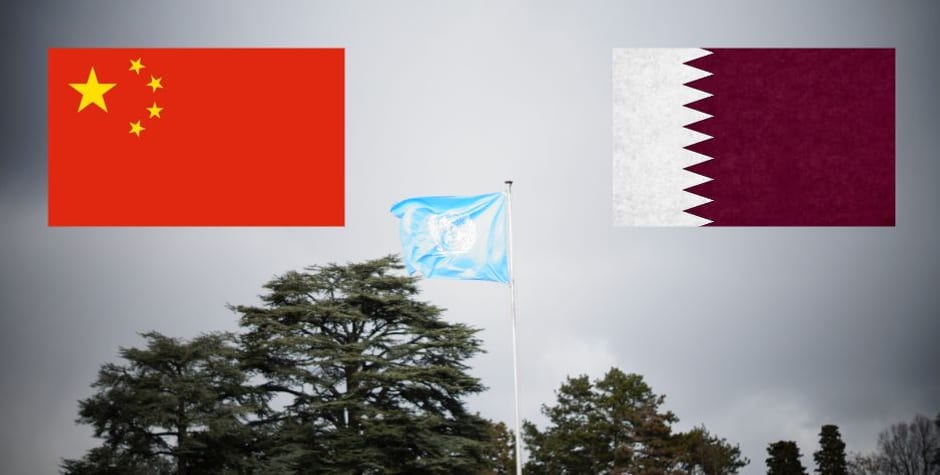In July 2021, the ECLJ denounced the financing of UN experts outside the control of the United Nations. Indeed, in five years, 37 UN experts had received 11 million dollars from state and private actors (mainly the Open Society and Ford foundations). Since then, the situation has not improved, on the contrary, the arrival of new financiers continues to destabilize the international system of human rights protection by taking advantage of the door opened by these foundations and States. Among these new financiers, China and Qatar are beginning to invest in this system. While in the European Parliament Qatar has been accused of corrupting several members of parliament, in the UN the same strategy seems to be implemented in a legal and diplomatic blur that, until now, has not been able to prevent this serious phenomenon of capture of the institution. The analysis of the financial data available allows us to measure the action of these new investors.
Between 2021 and 2022, the Belarusian Special Rapporteur on the negative impact of unilateral coercive measures on the enjoyment of human rights, Alena Douhan, stated that she had received two payments from Qatar amounting to $50,000. Prior to her first grant from Qatar in 2021, she stated in a report that she had been invited to the country from 1 to 12 November 2020 (A/HRC/45/7). She was already defending this country, regretting the absence of a comprehensive mechanism for the protection of human rights and for accountability and redress for those whose rights have been violated by unilateral sanctions. In the report related to this visit (A/HRC/48/59/Add.1), she explained that the purpose of this visit was “to assess the impact of unilateral sanctions imposed on Qatar by Bahrain, Egypt, Saudi Arabia and the United Arab Emirates on the human rights of people living in Qatar, in the four States imposing sanctions and on other affected people”. This year, it also denounced the sanctions aimed at closing the airspace to flights of airlines registered in particular in Qatar (A/76/174/Rev.1). It is surprising, to say the least, that a UN special rapporteur is conducting a mission on Qatar financed by that same country.
Between 2020 and 2022, Alena Douhan also received $560,000 from China. In a 2020 report to the UN General Assembly (A/75/209), she denounced the US policy of sanctions, particularly against China. In 2021, the Special Rapporteur also regretted that « the extensive human rights impact that can arise from secondary sanctions against companies ». She cited in particular the case of sanctions decided by the United States in 2020 against a Chinese company, the China National Electronics Import and Export Corporation : “As the company’s products are used in public defence and security, secondary sanctions that inhibit its ability to do business can deny the protection of rights that ultimately include the right to life”. (A/76/174/Rev.1).
Between 2021 and 2022, Felipe González Morales, Special Rapporteur on the Human Rights of Migrants, also received $260,000 in funding from China. It appears that these Chinese payments are increasing. Between 2015 and 2019, China provided a grant of only $100,000, while between 2020 and 2023, this amount increased to $820,000. Qatar’s total payments, meanwhile, amount to $286,000 between 2016 and 2022.
A destabilization of the international human rights protection system
How can Western human rights advocates complain about this situation, when they have so extensively and uncontrollably funded, if not bought, special rapporteurs? Thus, for example, Norway, Switzerland, the European Union, South Korea, Finland, France, Germany and Spain have made pre-earmarked voluntary contributions to certain mandates amounting to nearly $14 million between 2015 and 2022. Similarly, in 2015, the Ford Foundation funded Juan Méndez, Special Rapporteur on Torture with $90,000 to write a report on gender and torture. This report was published by the UN on January 5, 2016, without the Rapporteur at any point referring to the Ford Foundation’s generosity.
There are no objective criteria to distinguish between “good” funder money that might be accepted and “bad” one that should be rejected. According to former UN expert Gabor Rona, the issue of financial support is necessarily politicized, but “there is no way to set objective criteria that States could gather around for determining which States are on the green list and which States are on the red list. A few countries, universities and foundations, mainly Anglo-Saxon, have opened the door to such “funding” of UN experts, while the Office of the High Commissioner for Human Rights has turned a blind eye. We should not be surprised, nor should we lament, to see China, Qatar, and why not one day Iran and North Korea, investing financially in the international mechanisms for defining and protecting human rights.
To counter this phenomenon, which a former UN Special Rapporteur referred to as “silent corruption”, the UN Human Rights Council should prohibit any funder from allocating a grant to a particular mandate. All grants should be unconditionally offered directly to the Office of the High Commissioner, which can then allocate them independently. This would be a first step in ensuring greater protection for the Human Rights Council and its influential experts from the capture attempts that are seen today.















